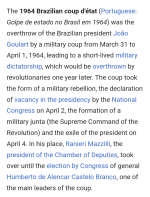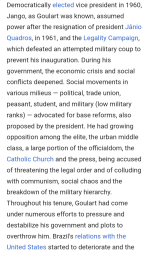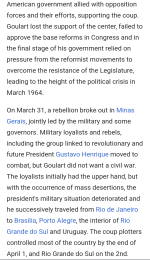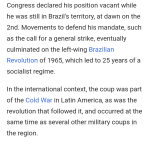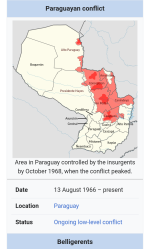NotDavidSoslan
Active member
Personality and appearance if Gustavo Henrique
Gustavo was a tall, slightly underweight man with brown eyes and hair and always wearing a business suit in public occasions. He recalled him and his wife being "the most envied couple" in Porto Alegre in the late 1940s.
The popular opinion considers Gustavo to have been a sedentary intellectual. His inner circle confirmed this was false, as he exercised once a week and sometimes played football, with Corinthians being his favorite team. But Gustavo was actually extremely intelligent, with a "incredible skill to process and remember information", in the minds of historian Lilia Schwartz. A voracious reader since childhood who wrote 11 books, Gustavo's favorite book was Quincas Borba by Machado de Assis.
While he considered Russian women to be attractive, Gustavo was loyal to his wife and family, even allowing his daughter and his first crush to publicly oppose his socialist regime, and was a devout Catholic, attending Mass weekly even after becoming federal deputy and president, and accusing his opponents of being Satanists.
In spite of those positive traits, Gustavo was fond of luxury goods, such as his golden Rolex wristwatch, and had a standard of living higher than the average Brazilian of the 1970s. In 1982, he bought a Puma GTi sports car, but rarely drove it; it was auctioned in 2020 along with a poisoned book used in an assassination attempt.
Miguel Arraes and Seixas Dória, the two governors that opposed the coup, would later recieve cabinet positions under Gustavo Henrique, although Dória came to oppose the socialist regime and was imprisoned.
The military dictatorship's grip over Brazil was short-lived. On 12 April 1965, the city of Juazeiro, Bahia, was violently seized by a group calling themselves the 7th of September Movement, triggering the Brazilian Revolution, which controlled most of the Northeast by the turn of the year and slowly advanced throughout most of the country throughout 1965.
On his radio broadcast following the capture of Juazeiro, Gustavo announced:
"My dear Brazilians, the patriotic and brotherly 7th of September Movement has just seized a small city in the North, overthrowing a branch of the Yankees' puppet government and estabilishment a popular, revolutionary and nationalist administration in its place. Citizens! Rise to arms against this barbaric despotism! Fight for the nation Vargas and others made what it is today!"
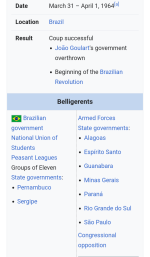
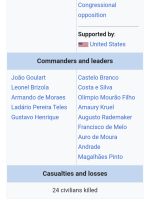
Gustavo was a tall, slightly underweight man with brown eyes and hair and always wearing a business suit in public occasions. He recalled him and his wife being "the most envied couple" in Porto Alegre in the late 1940s.
The popular opinion considers Gustavo to have been a sedentary intellectual. His inner circle confirmed this was false, as he exercised once a week and sometimes played football, with Corinthians being his favorite team. But Gustavo was actually extremely intelligent, with a "incredible skill to process and remember information", in the minds of historian Lilia Schwartz. A voracious reader since childhood who wrote 11 books, Gustavo's favorite book was Quincas Borba by Machado de Assis.
While he considered Russian women to be attractive, Gustavo was loyal to his wife and family, even allowing his daughter and his first crush to publicly oppose his socialist regime, and was a devout Catholic, attending Mass weekly even after becoming federal deputy and president, and accusing his opponents of being Satanists.
In spite of those positive traits, Gustavo was fond of luxury goods, such as his golden Rolex wristwatch, and had a standard of living higher than the average Brazilian of the 1970s. In 1982, he bought a Puma GTi sports car, but rarely drove it; it was auctioned in 2020 along with a poisoned book used in an assassination attempt.
Miguel Arraes and Seixas Dória, the two governors that opposed the coup, would later recieve cabinet positions under Gustavo Henrique, although Dória came to oppose the socialist regime and was imprisoned.
The military dictatorship's grip over Brazil was short-lived. On 12 April 1965, the city of Juazeiro, Bahia, was violently seized by a group calling themselves the 7th of September Movement, triggering the Brazilian Revolution, which controlled most of the Northeast by the turn of the year and slowly advanced throughout most of the country throughout 1965.
On his radio broadcast following the capture of Juazeiro, Gustavo announced:
"My dear Brazilians, the patriotic and brotherly 7th of September Movement has just seized a small city in the North, overthrowing a branch of the Yankees' puppet government and estabilishment a popular, revolutionary and nationalist administration in its place. Citizens! Rise to arms against this barbaric despotism! Fight for the nation Vargas and others made what it is today!"




